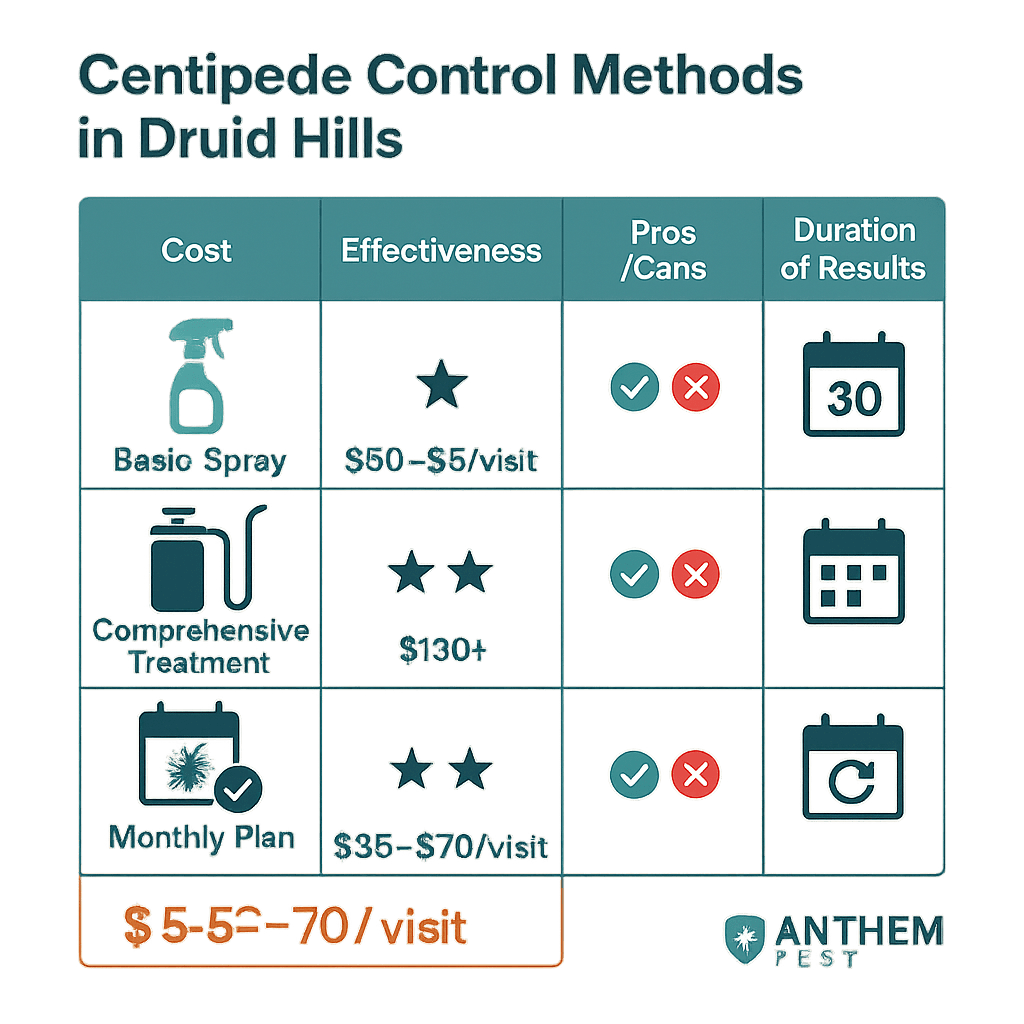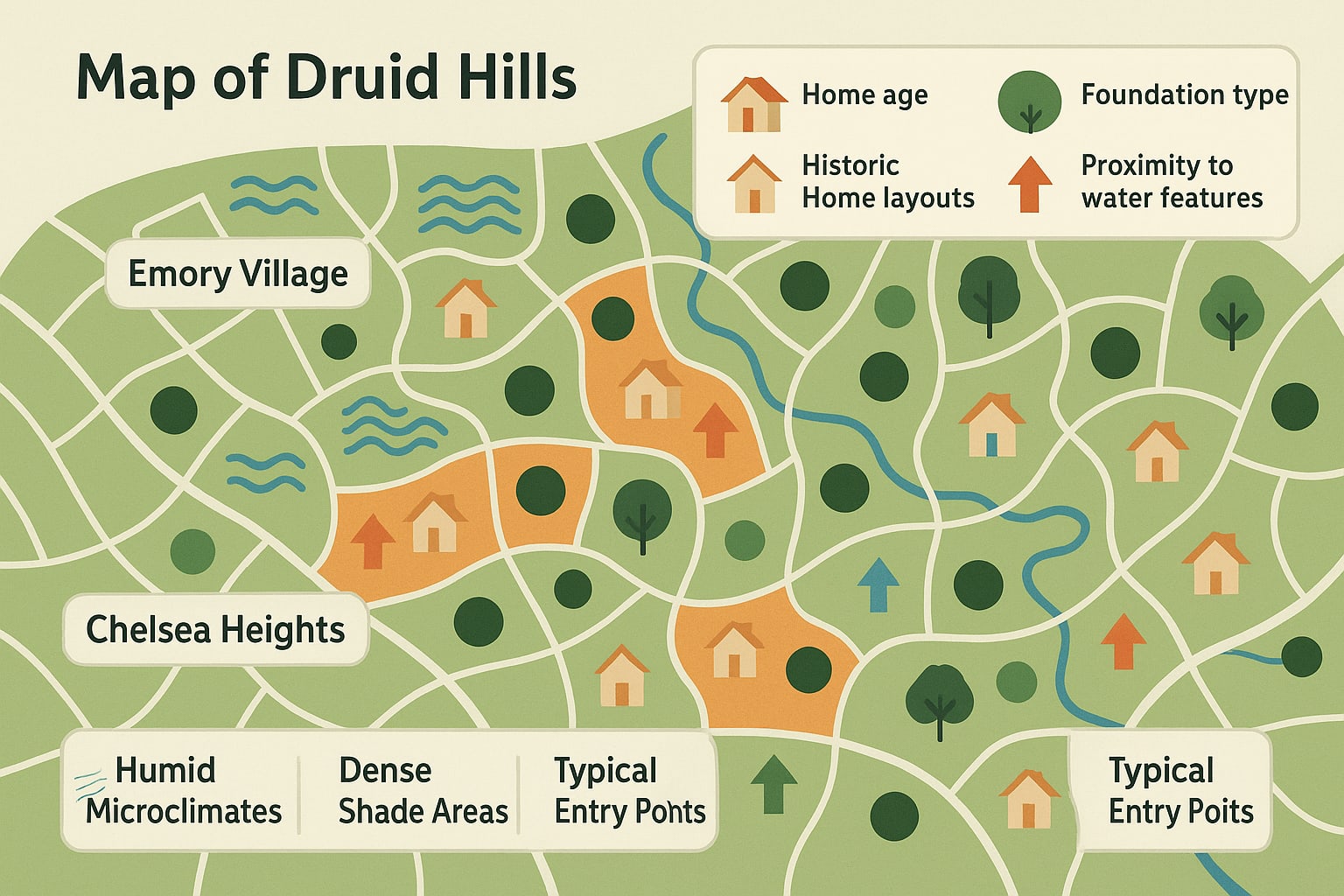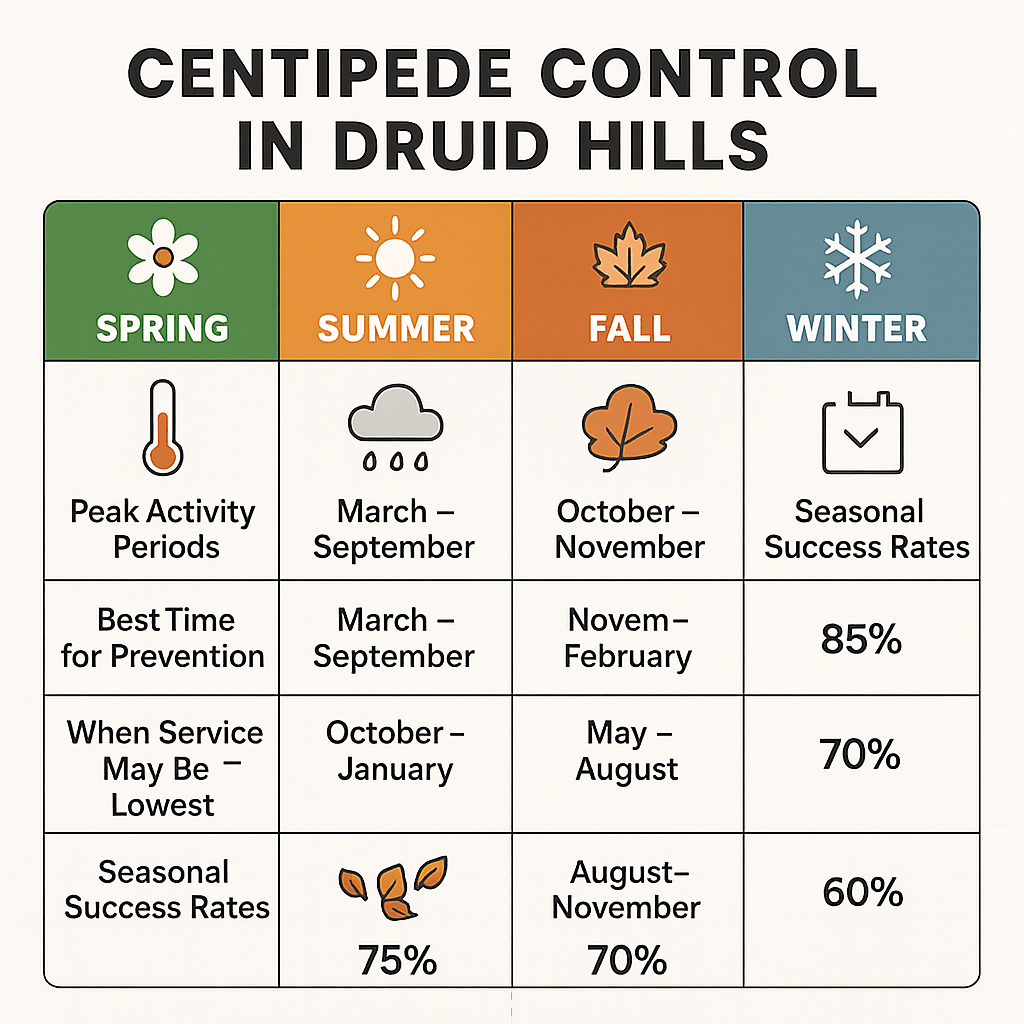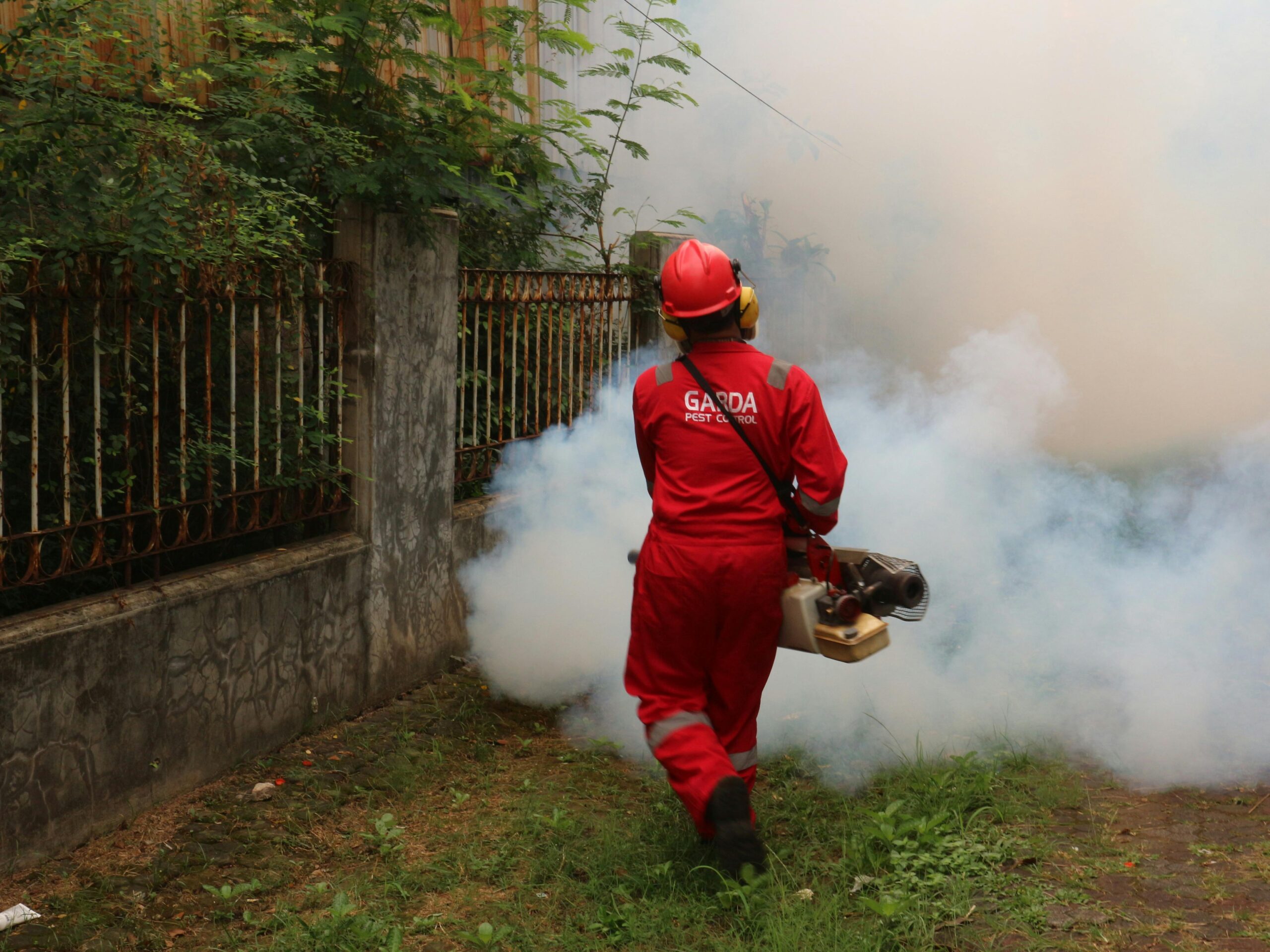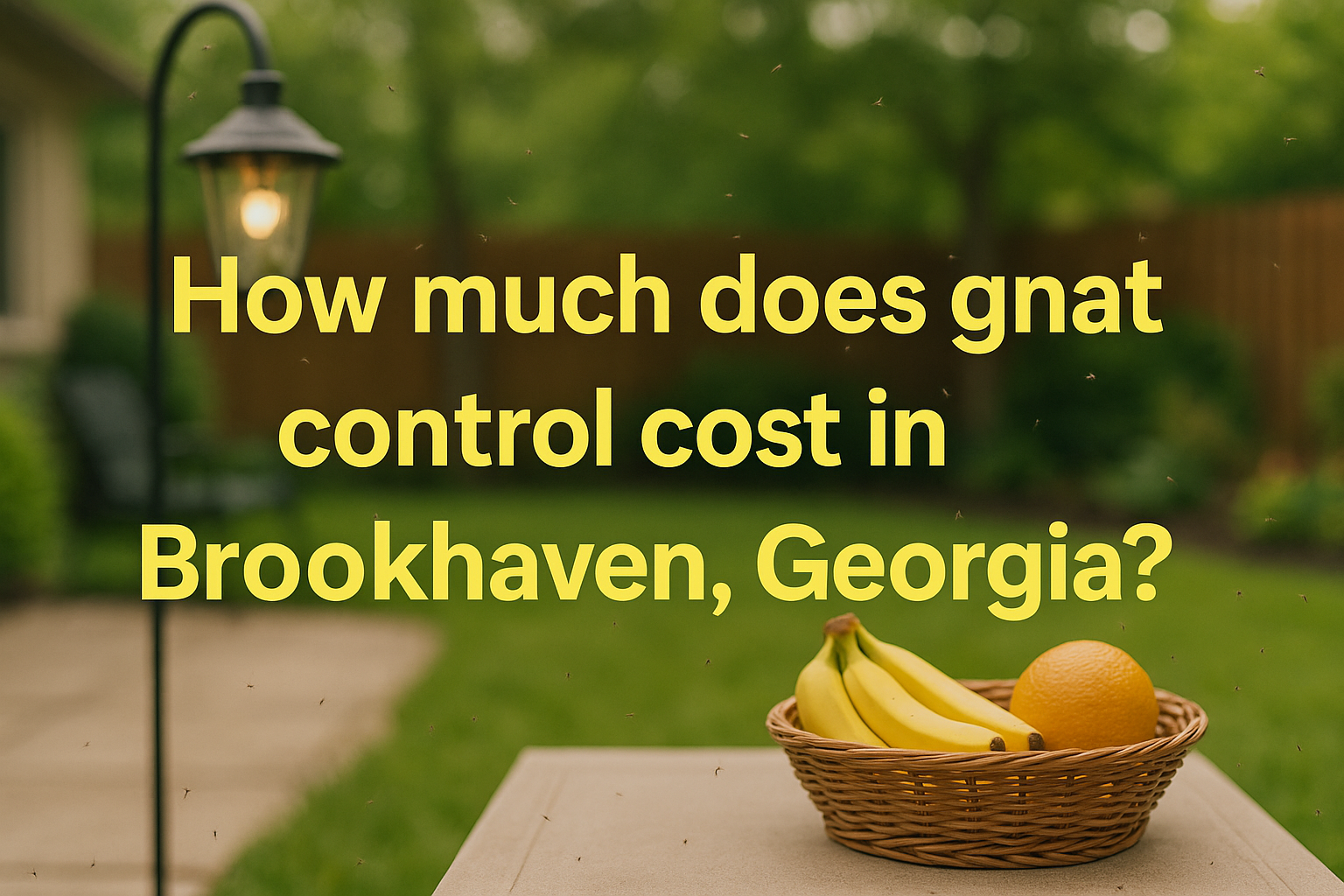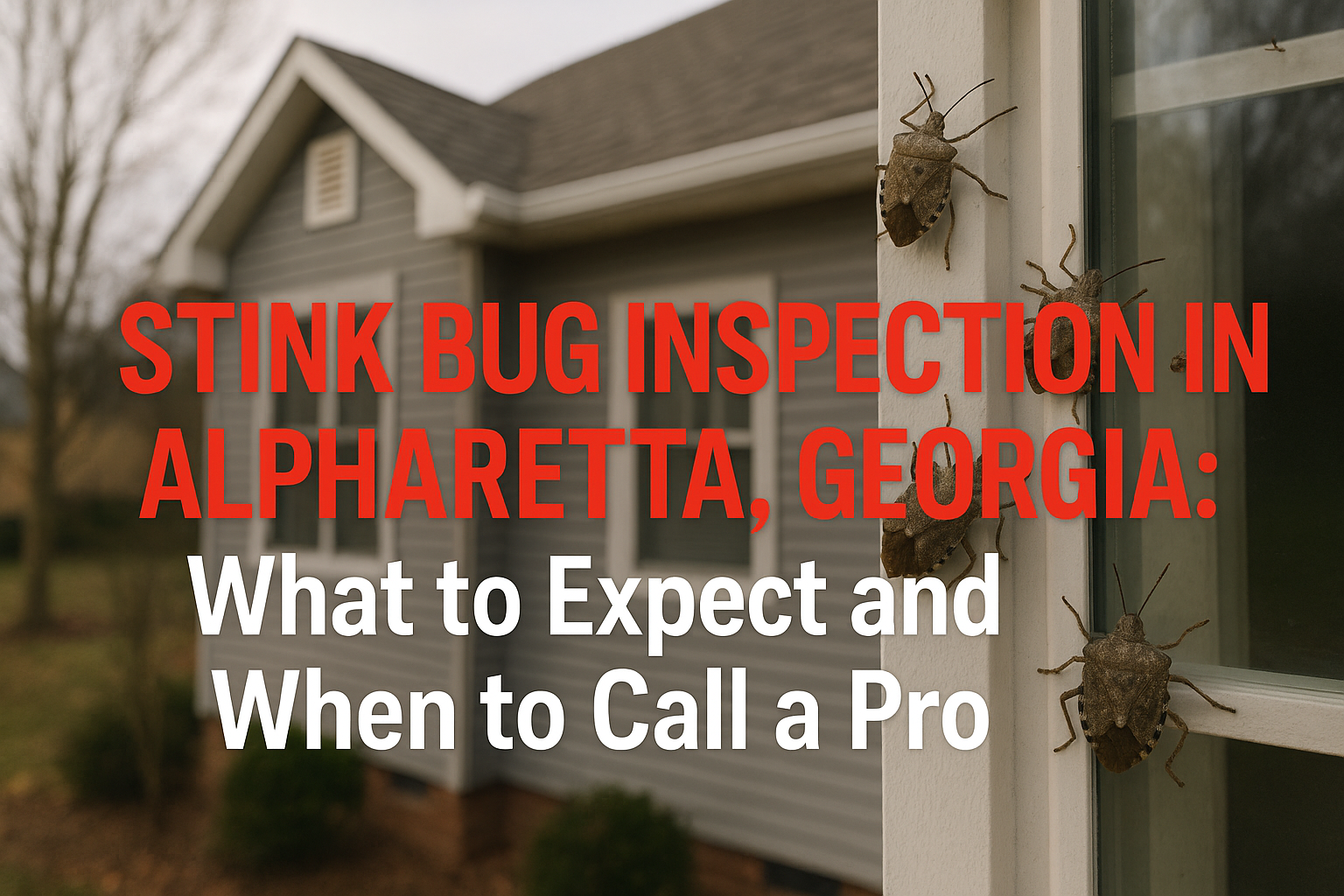If you’ve ever flipped on a bathroom light in Druid Hills only to spot a quick, skittering centipede dart for cover, you’re not alone. These guys love the cozy, humid conditions our leafy community provides, and older homes with mature landscaping make for the perfect hideout. While centipedes usually stay out of sight, their sudden appearances—and those many fast-moving legs—are enough to give anyone pause. Plus, their presence can signal bigger moisture or entry-point problems in your home, issues that are all too common in our older brick and wood-frame houses. That’s why many homeowners start researching centipede control cost Druid Hills experts recommend before the problem gets worse.
Now, the good news is these critters aren’t out to get you. Their bite is rarely dangerous; honestly, most folks are more startled than anything else. But let’s face it—a few centipedes can quickly turn into a recurring headache if you let things go untreated. Druid Hills’ unique blend of shaded yards, high humidity, and aged foundations means centipede populations can swell faster than you might expect, especially after rain or in basements that never seem to quite dry out.
When it comes to tackling this problem, most Druid Hills homeowners pay somewhere between $50 and $139 for a one-time visit from a pest pro. For those wanting to keep centipedes away for good, monthly prevention services usually cost $35 to $70 per visit, with prices varying depending on your home’s size and how bad the problem is. Compared to other Atlanta neighborhoods, the pricing stays steady, but Druid Hills’ architecture and greenery bring their own hassles and risks. Ignore a creeping centipede population, and you could be looking at a much bigger (and pricier) issue down the line.
So, what’s the smartest way to handle these unwelcome guests? In this article, you’ll find out exactly what centipede control costs here in Druid Hills. We’ll break down what you can expect to pay, show you where your money goes, and share some local-friendly tips to keep those costs down. Whether you’re weighing treatment options or hoping to prevent a repeat invasion, you’re in the right spot. Read on for real numbers, expert advice, and some practical steps you can take to keep your home centipede-free year round.
What Really Impacts the Price of Centipede Control in Druid Hills?
If you’ve ever found a centipede scurrying across your Druid Hills floor, you know trying to guess the centipede control cost Druid Hills homeowners might face is almost as nerve-wracking as the invader itself. The truth is, the price to tackle centipedes can swing quite a bit based on a few real-life factors. Let’s break down exactly what can drive up or drop the bill, so you know what to expect—and none of it’s smoke and mirrors.
- Home Size: Bigger homes and larger lots in Druid Hills generally need more treatment—more rooms, more hiding places, more time on site. If you’re in a classic house in Lullwater or something roomier near Emory Village, expect a little more on your quote compared to a cozy bungalow.
- Severity of the Infestation: Here’s the big one. If you spot just a couple centipedes, a basic treatment can sometimes run as low as $50–$65. But if they’re popping up all over, getting rid of every last one (and whatever’s feeding them) can take $130 or more at first. The more established the colony, the more resources and elbow grease it’ll take.
- Type of Service Needed: Not all centipede jobs are one-and-done. Ongoing monthly plans typically cost $35–$70 per visit, with quarterly options ranging $110–$250. These can be a money-saver if you want reliable protection year-round—especially since Druid Hills’ leafy yards and moisture make a perfect centipede hangout.
- Emergency or After-Hours Calls: If you need someone out fast, say after you stumble across a centipede parade late at night, expect to tack on another $25–$100 for prompt, off-hours help. It’s the price of peace of mind.
- The Right Solution for Your Home: A straightforward perimeter spray is easy on the wallet. But if your home needs extra work like moisture control, sealing cracks, or addressing other pests luring centipedes inside, the full package will cost more—but it’s often the only way to stop the revolving door.
- The Neighborhood Factor: Location in Druid Hills has real influence. Some blocks have larger homes, intricate landscaping, or older foundations that push labor and time costs up. For up-to-date, hyperlocal insight on pricing, check out centipede control costs in Peachtree City or Milton—these numbers line up closely with what you’ll find here.
Bottom line? Every centipede situation in Druid Hills is a little different. Knowing what shapes the price—your house, the severity, how often you want treatments, and which solutions actually solve the problem—helps you budget with no surprises. A quick call or text to your local pros gets you a quote fast, so you can get back to enjoying your home, not worrying about crawlies.
What Really Impacts the Price of Centipede Control in Druid Hills?
If you’ve ever found a centipede scurrying across your Druid Hills floor, you know trying to figure out the centipede control cost Druid Hills homeowners might face is almost as nerve-wracking as the invader itself. The truth is, the price to tackle centipedes can swing quite a bit based on a few real-life factors. Let’s break down exactly what can drive up or drop the bill, so you know what to expect—and none of it’s smoke and mirrors.
- Home Size: Bigger homes and larger lots in Druid Hills generally need more treatment—more rooms, more hiding places, more time on site. If you’re in a classic house in Lullwater or something roomier near Emory Village, expect a little more on your quote compared to a cozy bungalow.
- Severity of the Infestation: Here’s the big one. If you spot just a couple centipedes, a basic treatment can sometimes run as low as $50–$65. But if they’re popping up all over, getting rid of every last one (and whatever’s feeding them) can take $130 or more at first. The more established the colony, the more resources and elbow grease it’ll take.
- Type of Service Needed: Not all centipede jobs are one-and-done. Ongoing monthly plans typically cost $35–$70 per visit, with quarterly options ranging $110–$250. These can be a money-saver if you want reliable protection year-round—especially since Druid Hills’ leafy yards and moisture make a perfect centipede hangout.
- Emergency or After-Hours Calls: If you need someone out fast, say after you stumble across a centipede parade late at night, expect to tack on another $25–$100 for prompt, off-hours help. It’s the price of peace of mind.
- The Right Solution for Your Home: A straightforward perimeter spray is easy on the wallet. But if your home needs extra work like moisture control, sealing cracks, or addressing other pests luring centipedes inside, the full package will cost more—but it’s often the only way to stop the revolving door.
- The Neighborhood Factor: Location in Druid Hills has real influence. Some blocks have larger homes, intricate landscaping, or older foundations that push labor and time costs up. For up-to-date, hyperlocal insight on pricing, check out centipede control costs in Peachtree City or Milton—these numbers line up closely with what you’ll find here.
Bottom line? Every centipede situation in Druid Hills is a little different. Knowing what shapes the price—your house, the severity, how often you want treatments, and which solutions actually solve the problem—helps you budget with no surprises. A quick call or text to your local pros gets you a quote fast, so you can get back to enjoying your home, not worrying about crawlies.
Why Druid Hills Homes Face Unique Centipede Challenges
If you live in Druid Hills, you already know our weather isn’t exactly gentle. Sticky summers and frequent rains create the perfect hideouts for centipedes—they thrive in that damp, shaded environment. Once the humidity sets in, you can bet your bottom dollar they’re looking for cozy spots to sneak inside.
The personality of our neighborhood adds layers to the problem. Many of Druid Hills’ charming Tudor homes, bungalows near Fernbank, and those stylish new renos all have their quirks. Older properties, in particular, were built with crawl spaces and basements that tend to collect moisture over time—a recipe for unwanted guests like centipedes. Combined with quirky floorplans, original windows, and sometimes less-than-perfect weather seals, there are plenty of places for bugs to find their way inside.
Have you got dense trees shading the yard, flower beds hugging your porch, or a classic Atlanta stone retaining wall? These features help keep your curb appeal up, but they also boost the chances for centipede infestations. Damp leaf piles, mulch, and crevices around foundations become prime launching pads for pests looking to move indoors, especially after a spring storm or during early fall when leaf litter piles up.
Areas closer to Peavine Creek or blocks with higher moisture content often deal with tougher, more persistent centipede problems. Sometimes these spots need more frequent or even more involved treatments, which can mean a bump in pricing—inside, outside, sometimes both. If you’ve experienced these stubborn infestations, you know generic pricing isn’t in the cards; most Druid Hills homeowners end up needing a quote that takes your property and landscape into account.
All these local factors—our weather, your home’s age and design, and the unique features of your lot—add up. They influence not just how you might tackle a current infestation, but also the centipede control cost Druid Hills homeowners can expect to keep their property protected season after season. The result? Truly effective centipede control here isn’t one-size-fits-all, and that’s why a personalized inspection and quote are the smart, local choice.
How to Keep Centipedes—and Unnecessary Costs—at Bay in Druid Hills
If you’re like most homeowners in Druid Hills, you’d rather not see another centipede darting under your furniture any time soon. The good news? A few straightforward steps can help you avoid surprises—both from pests and from unexpected pest control bills.
Let’s start indoors. Centipedes love damp, cluttered places (think: basements, laundry rooms, or anywhere moisture collects). The quickest way to send them packing is to dry things out. Consider running a dehumidifier in your basement or any lower-level room that feels a bit muggy. Fix leaky pipes as soon as you spot them, and don’t let cardboard boxes or piles of clothes linger in corners—centipedes adore those hidden, musty nooks.
Outdoor habits matter just as much. If you’ve got mulch or a stack of leaves close to your foundation, it’s like sending centipedes a handwritten invitation. Move mulch, fallen leaves, or firewood piles several feet away from your exterior walls. Trim back any overgrown shrubs touching the house—these act as shady, damp shelters that centipedes (and lots of other pests) just can’t resist.
Older homes in Druid Hills often have little gaps that make perfect entry points. Walk your property and check for cracks along the foundation, warped door frames, or old window seals. Sealing up these spots using weatherstripping or caulk keeps pests out and helps your AC work more efficiently—double win! Don’t forget vent covers; a simple fix that blocks a common entry route.
The real secret to saving money? Don’t wait until you’re overrun. Routine professional checkups—monthly or even quarterly—nearly always cost less in the long run than one big, emergency treatment. Keeping up with regular service means catching problems while they’re small and affordable. In fact, the centipede control cost Druid Hills homeowners pay for preventive visits is often as low as $35 to $70, especially if your place is well-maintained and centipedes haven’t set up shop yet.
Finally, ask your pest pro about seasonal treatments. Preventive sprays and moisture management before spring and summer go a long way toward keeping things quiet year-round. Dedicating a little time now means fewer headaches later and can put some real dollars back in your pocket.
Stay tuned—we’ll be sharing a handy visual checklist and tips for the best seasonal timing, so you’ll always know exactly what to do, and when.
When to Tackle Centipede Problems in Druid Hills
If you’ve spotted a centipede scurrying along your baseboards, you’re not alone—Druid Hills homeowners usually start noticing these leggy intruders as the weather shifts. Centipede activity takes off in two big waves each year, and knowing when they’re most active can save you a ton of hassle (and cash) when it comes to pest control.
Spring (March-April) brings the first burst. As humidity rises, centipedes (and their favorite snacks) start heading indoors to escape chilly mornings and April showers. Gutters clog with leaf bits, garden beds get messy, and suddenly you’ve got more hiding spots than you realized. It’s no surprise local pest pros get a spike in calls as soon as thaws begin.
Early fall (September-October) kicks off the second round, when cool evenings drive centipedes from damp lawns into the warmth of your home. Fall garden cleanup can stir up nests, making it prime time for unexpected run-ins in basements or bathrooms.
Most folks wait until these pests make themselves known, but honestly, that’s when demand for pest control peaks. That often means higher prices or more limited scheduling options. Instead, those in the know in Druid Hills book preventive treatments just before things ramp up—think February for spring, or late August for fall. That way, you’ve got a fresh barrier in place before centipedes ever get the memo.
Winter? Not urgent for control, but smart for staying ahead—sealing cracks, managing indoor moisture, and setting up routine checks gets you ahead of the spring crowd (and could snag you a lower rate, since it’s slower season). Anthem Pest’s monthly plans are popular with local homeowners looking to lock in savings and peace of mind months before the rest start calling.
Seasonal Timing: What Works Best?
- Late winter to early spring: Ideal for prevention; catch centipedes as they start looking for indoor shelter.
- Early fall: Seal your home and treat outdoor hiding spots before the chill drives them inside.
- Summer: Maintenance visits for established problems or if you’ve seen activity.
- Winter: Not urgent, but the best time to focus on repairs, moisture control, and prepping for busier months ahead.
You don’t have to wait until centipedes surprise you in the shower. Consider timing your pest control before their busiest seasons—you’ll have fewer surprises, better rates, and a home that feels comfortable all year long.
Let Local Pros Help—Get Your Free Centipede Control Quote Today
Still spotting centipedes around your Druid Hills home? Don’t let them stick around. Anthem Pest offers local expertise and honest pricing—just give us a call and you’ll get a free, no-obligation assessment that’s tailored to your house. Our techs know every street and style of home in Druid Hills, so we don’t just guess—we nail down the best approach for your place.
No pressure or hidden charges—just straight talk about your options, and plans starting at only $50 for small jobs. Get answers to every centipede question, understand your costs up front, and move forward with confidence. Call us now at 877-3718-5196 or visit this page for a fast, friendly quote you can trust. No surprises, just results.
Top Questions Druid Hills Homeowners Ask About Centipede Control
- Are centipedes actually dangerous for my family or pets?
Honestly, most centipedes you’ll see in Druid Hills aren’t much more than a nuisance. They might look creepy, but their bite is rarely a big deal for people or pets—maybe a little swelling, nothing serious. You won’t find anything like a brown recluse or black widow situation here. - If I spot a centipede in my house, how fast can Anthem Pest get here?
We know how it feels to see a centipede skittering across the bathroom floor! Most of the time, Anthem Pest has Druid Hills homeowners covered with same-day or next-day service. If it’s an emergency, just give us a call—we’ll move you to the front of the line (there’s usually a small extra fee for those urgent calls). - How often should I have my house treated to keep centipedes out?
With Atlanta-area humidity and our mix of beautiful old homes, monthly or at least quarterly visits are what really works. It’s the best way to keep centipedes (and their food sources—like other bugs) far from your living spaces, year-round. - What’s the most budget-friendly plan for long-term centipede control?
You’ll save the most by going with a prevention plan—typically between $35 and $70 a month, depending on your property. It’s way less expensive than waiting until there’s a surprise infestation and you need an emergency treatment. - Is it safe for my kids and pets?
Absolutely. Everything Anthem Pest uses is EPA-approved and safe when applied correctly. Our team follows strict safety steps, and the company is fully licensed and insured, so you can relax once we’re on the job. - Can I do anything myself to keep centipedes away?
You bet—start by lowering humidity inside, sealing gaps and cracks, and keeping mulch and yard debris away from your foundation. Small steps help, but for full peace of mind, regular pro service is still your best bet, especially in our Druid Hills climate. - Will routine treatments take care of other nuisance bugs too?
For sure! Preventive visits keep down ants, spiders, and a bunch of other pests, not just centipedes. It’s a win-win for a bug-free home. - Where can I get more details on pricing or options?
Head over to Anthem Pest’s local customer pages for all the latest info on pricing and plans: Peachtree City Centipede Control or Centipede Control Cost Milton. Full breakdowns, no hidden fees, no guesswork.


